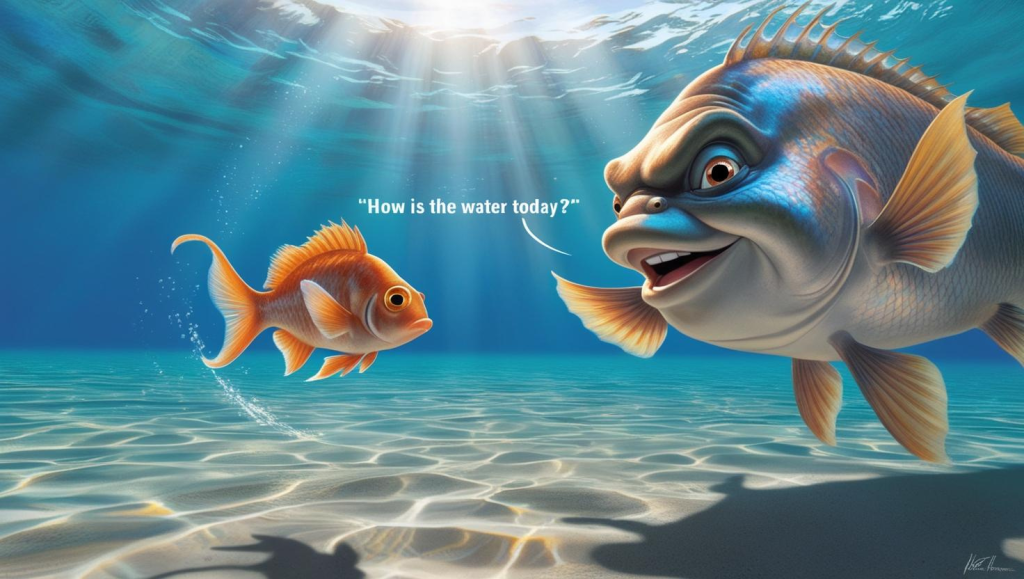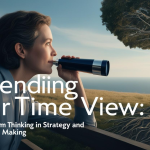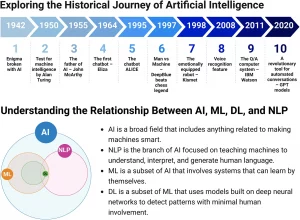Imagine for a moment that you are a fish, small and darting, swimming tirelessly in an element that completely envelops it. One day, you meet an older fish who asks you with a wise smile: “How is the water today?”. You, young and unaware, stop, confused. “Water? What is water?”.
This simple parable, apparently harmless, contains a profound truth that often escapes us in the frenzy of our days. We are immersed in a constant reality, woven with invisible threads that connect everything, but we rarely stop to contemplate its essence. Just as fish do not perceive water, we tend to take for granted the very foundations of our existence, the most obvious truths that constantly surround us.
Adult life, with its load of responsibilities, deadlines and small daily frustrations, risks turning into a succession of automatisms. We move through our routines like sleepwalkers, trapped in a “default setting” of the mind that causes us to perceive the world solely through the filter of our self. In this narrow perspective, we are inevitably the center of our universe, the only protagonists of a story in which others appear in the background, often as obstacles or extras.
This innate tendency towards self-centeredness, however natural it may seem, imprisons us in an inner solitude. Every experience is filtered through our desires, our fears and our expectations, blinding us to the realities of others. We convince ourselves, at a deep level, that our worries are the most urgent, our pains the most acute, our perspectives the only valid ones.
But there is a way out of this golden prison of the self, a path that leads to a richer and more vibrant understanding of the world. This path is called awareness, the ability to awaken from the torpor of automatism and to actively choose what to pay attention to. It is not simply a matter of accumulating knowledge or developing intellectual skills, but of cultivating an inner gaze capable of discerning the hidden mechanisms of our thinking and the prejudices that color our perception.
Learning to think, in its most authentic sense, means learning to choose what to think. It means exercising a kind of sovereignty over our mind, directing our attention towards what really matters, building meaning from experiences rather than being passively overwhelmed by them. This ability to self-regulate thought is a precious form of freedom, the key to a life lived with full intensity.
Imagine finding yourself at the supermarket after a long day at work. Tiredness weighs down your shoulders, hunger tightens your stomach, the desire to go home is almost physical. Around you, the crowd moves slowly and seemingly aimlessly, the neon lights are merciless, the background music irritating. Your default reaction might be annoyance, impatience, even anger. “Why is this line so long? Why is that person pushing the cart in the middle of the aisle? Don’t they understand that I’m in a hurry?”
But in this seemingly banal scenario, in this small “trench” of daily life, lies an extraordinary opportunity. You have the opportunity to choose how to interpret what happens to you. Instead of focusing solely on your own discomfort, you can try considering the perspective of others. Maybe that mother who scolds her child is exhausted and overwhelmed by problems much bigger than a spilled cereal box. Perhaps that person who appears to be moving slowly has a valid reason for his or her unsteady gait. Maybe he’s simply having a difficult day like yours.
This conscious choice to turn our gaze outward, to attempt to understand the world through the eyes of others, is the essence of empathy. It is not an act of pure goodness or sacrifice, but an exercise in emotional intelligence that enriches our very existence. Recognizing the common humanity that binds us, the fragilities and shared aspirations, transforms our experience of the world from a sequence of individual frustrations to a complex web of meaningful interactions.
In adult life, we constantly find ourselves at a crucial crossroads: we can remain prisoners of our self-centered “default setting,” or we can force ourselves to “stay awake,” to cultivate a vigilant awareness of the world around us and our own internal reactions. This inner vigilance allows us to recognize our automatic tendencies, our hasty judgments, our small daily pettinesses.
There is another fundamental aspect to consider: what we choose to value, what we venerate, shapes us profoundly. In our society, we are often bombarded with messages that push us to venerate material success, ephemeral beauty, power over others. But chasing these “false gods” inevitably leads to deep dissatisfaction. Money is never enough, beauty fades, power corrupts and enslaves to the fear of losing it.
True freedom and fullness are found in consciously choosing to worship something higher, something that nourishes our soul rather than devours it. It could be an ideal of service to others, a commitment to justice, a deep connection with nature, a form of spirituality that transcends us. This conscious choice of our values guides our actions, directs our priorities and gives a deeper meaning to our journey.
Life, in its essence, is a continuous flow of moments, often banal, sometimes extraordinary. The real challenge consists in finding wonder even in the ordinary, in recognizing the sacredness of everyday life. We don’t have to wait for momentous events to experience beauty or connection. A sincere smile, an unexpected gesture of kindness, the contemplation of a sunset, an authentic conversation: these are the fragments that make up the mosaic of a meaningful life.
Waking up to the reality around us, recognizing the water we swim in, is an act of courage and humility. It requires constant effort to overcome our innate tendency towards self-centeredness and to open ourselves to the perspective of others. But the reward is immense: a richer, more connected, more deeply human life.
So, the next time you feel trapped in the frustration of a queue, in the monotony of a routine, in the weight of your worries, stop for a moment. Remember the story of the fish. Ask yourself, “How is the water today?” And with a conscious effort, choose to see the world with new eyes, with an open heart, with the knowledge that every moment is a precious gift, an opportunity to awaken to the wonder of the invisible heartbeat of life.









